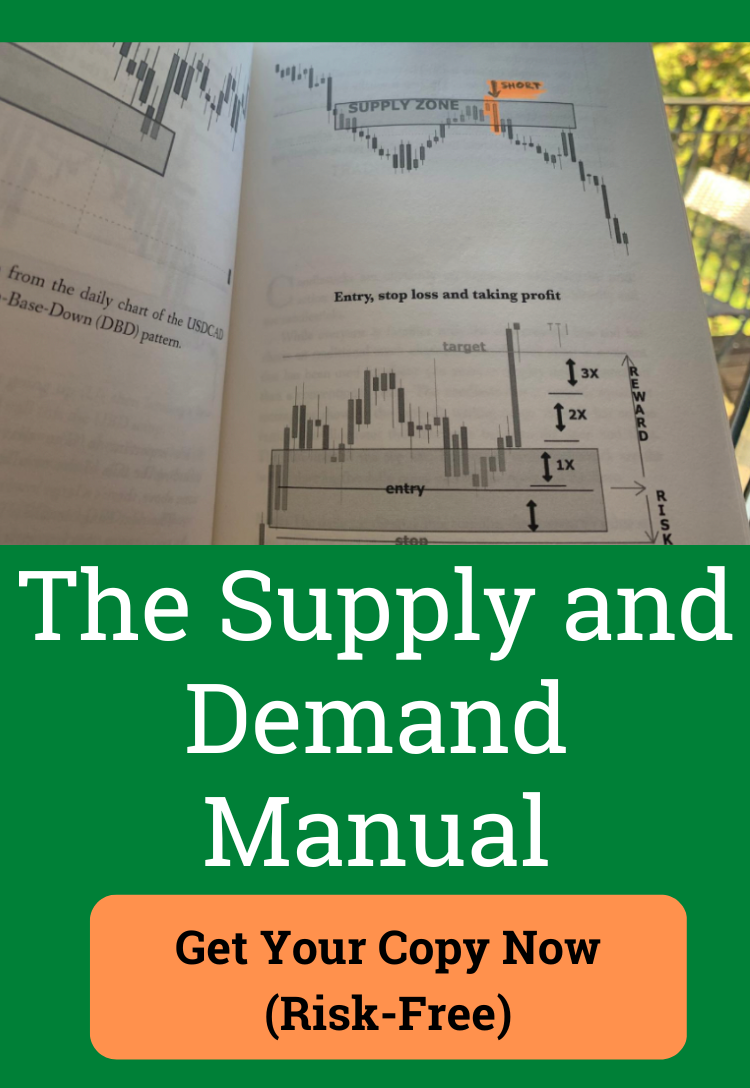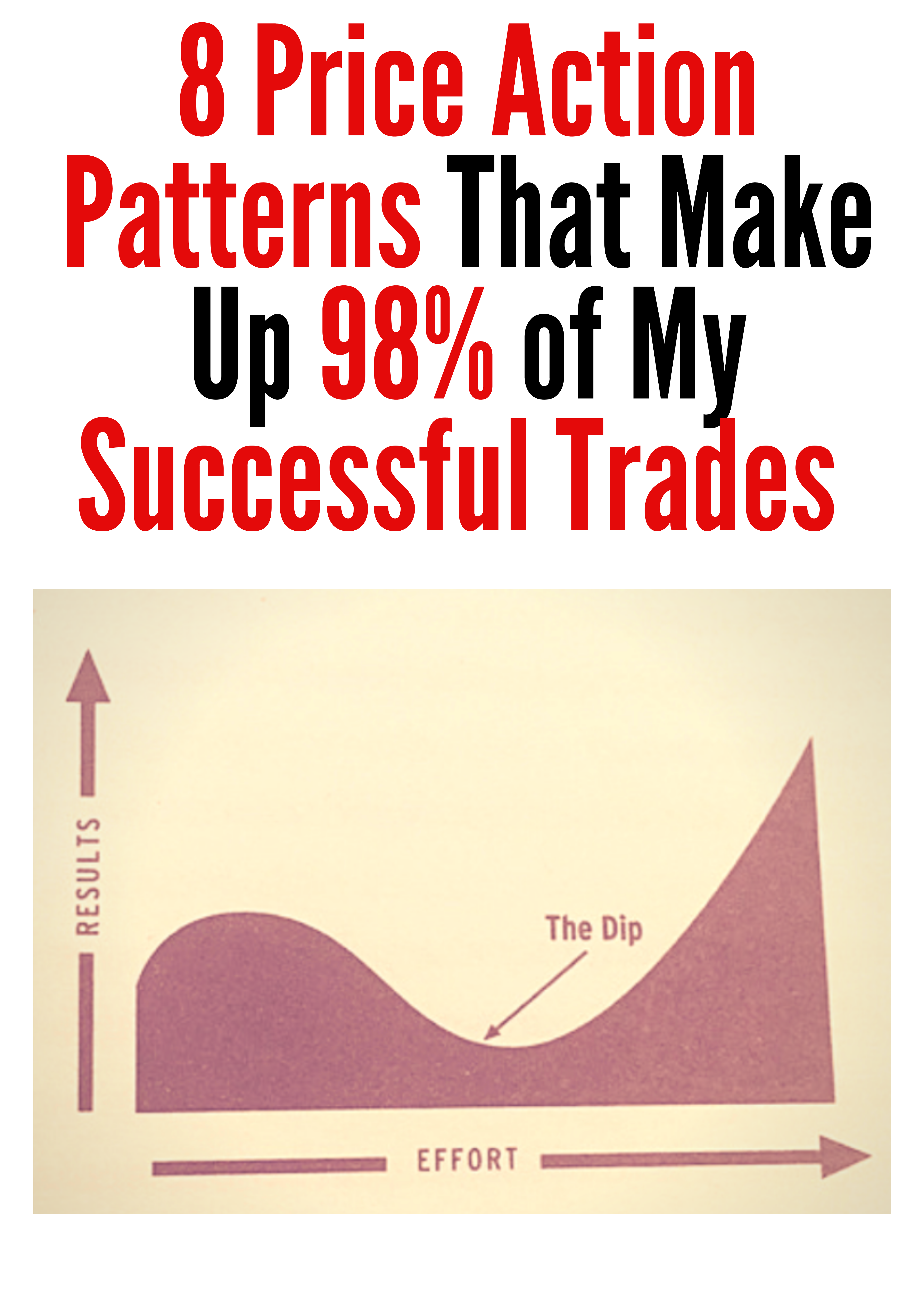7 Best Stock Market Courses to Master Trading in 2025
The stock market isn't just about luck; it's about skill, strategy, and discipline. But with countless gurus and platforms promising instant wealth, how do you find a legitimate path to consistent profitability? A truly effective course doesn't just teach you patterns; it transforms your mindset, hones your risk management, and gives you a repeatable process for any market condition. This guide cuts through the noise. We've analyzed the industry's top programs to bring you the seven best stock market courses available today, evaluating them on curriculum, teaching style, practical application, and student outcomes.
This curated roundup is designed to be your definitive resource, helping you move from inconsistent results to a structured, professional approach. Each review offers a deep dive into the course structure, who it’s best for, pricing, and the specific trading skills you'll master. We include direct links and screenshots so you can see exactly what each platform offers before committing.
Whether you're a complete beginner seeking foundational knowledge or an experienced trader aiming to master a specific strategy like price action, this comparison will help you identify the perfect educational partner to achieve your financial goals. Understanding how these programs are built can also provide valuable insights. To gain a deeper understanding of the online learning landscape, you might also find it useful to explore the best platforms to sell online courses. Let's find the course that will become your first, and most important, profitable trade.
1. Colibri Trader
Colibri Trader stands out as a premier destination for traders who want to master the markets using a clean, powerful, and repeatable methodology. It’s designed for learners who prioritize practical, action-based skills over abstract theory, focusing on a pure price-action approach that eliminates the need for lagging indicators or complex fundamental analysis. This makes it one of the best stock market courses for developing a core, adaptable trading skill set.

The platform is built on the philosophy that true market understanding comes from reading price charts directly. Its curriculum is engineered to teach traders how to identify high-probability setups in any market condition, whether bull or bear, empowering them to trade with confidence and discipline.
Why It Excels: A Focus on Actionable Skills and Mentorship
Colibri Trader distinguishes itself through a structured, mentor-led learning path that has guided over 8,000 students. Instead of just presenting information, the program is designed to transform a student's trading habits, focusing intently on risk management, trading psychology, and consistent execution. The strong emphasis on these pillars, combined with a proven price-action strategy, is what creates sustainable results.
The platform offers a generous entry point for prospective students. You can take a free Trading Potential Quiz or download the first two chapters of the founder's Amazon bestselling book on price action. This allows you to fully evaluate the methodology and teaching style before making any financial commitment, a transparent approach not often seen in the industry.
Core Offerings and Learning Path
The educational journey at Colibri Trader is logically structured to take you from foundational knowledge to advanced execution.
- Foundational Courses (Basic/Premium): These programs lay the groundwork for the core price-action strategy, teaching you how to read charts, identify key patterns, and manage trades effectively.
- The Ultimate Supply & Demand Course: This award-winning course is a deep dive into one of the most powerful concepts in trading. Students learn to pinpoint institutional buying and selling zones, giving them a significant edge in anticipating market movements.
- Advanced Day Trading Programme: For experienced traders, this program refines skills for short-term market execution, focusing on precision entries and exits for intraday opportunities.
This comprehensive structure ensures there is a clear and effective progression for traders at every stage. For those wanting a deeper dive into how this platform compares, you can learn more about Colibri Trader's take on the best courses for traders and their philosophy.
Key Strengths and Considerations
| Pros | Cons |
|---|---|
| Indicator-Free Strategy: Teaches a clean price-action system that works in all market conditions without confusing indicators. | No Public Pricing: Course costs are not listed publicly; you must engage with free content or subscribe to view pricing options. |
| Strong Social Proof: Backed by 8,000+ students, hundreds of testimonials, and features on prominent trading websites. | No Formal Certification: The focus is on practical skill transformation, not academic accreditation or diplomas. |
| Complete Learning Path: Offers a full curriculum from beginner price action to advanced supply & demand and day trading. | Results Are Effort-Dependent: Success is not guaranteed and relies heavily on student discipline and market risk management. |
| Focus on Psychology & Discipline: Goes beyond tactics to instill the mental habits required for long-term trading consistency. | Gated Advanced Content: Some advanced programs, like the Day Trading Programme, are only available to existing subscribers. |
| Risk-Free Previews: Free book chapters and a trading quiz allow you to test the methodology before committing to a paid course. |
Ultimately, Colibri Trader earns its top spot by offering a robust, proven, and practical path to trading mastery. It is an excellent choice for self-motivated learners who value a clear, repeatable system and strong mentorship over theoretical credentials.
Website: https://www.colibritrader.com
2. Coursera
For learners who value academic rigor and a structured, university-level foundation, Coursera is an unparalleled resource. Unlike platforms focused solely on proprietary trading strategies, Coursera provides access to courses from world-renowned institutions like Yale, the University of Michigan, and Duke. This makes it one of the best stock market courses for building a deep, theoretical understanding of how financial markets operate before diving into tactical execution.
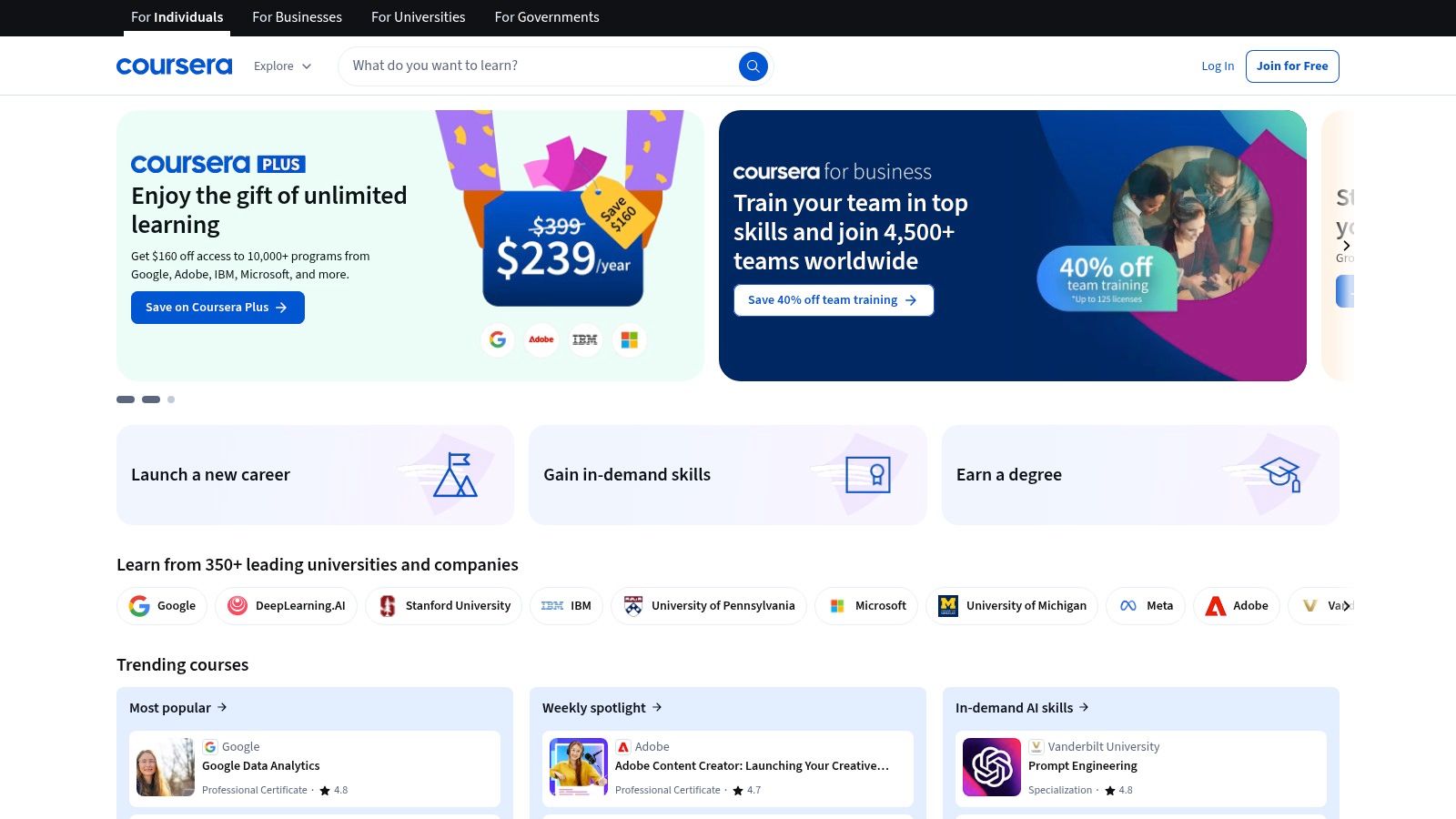
The platform’s standout offering is its connection to elite educators. For instance, you can enroll in Yale University’s “Financial Markets,” taught by Nobel laureate economist Robert Shiller. Courses like these provide a robust framework in concepts such as behavioral finance, risk management, and market efficiency, which are critical for long-term success but often overlooked in purely technical courses. This self-paced, online learning environment provides flexibility that many learners appreciate over traditional classroom settings.
Who It's Best For
Coursera is ideal for beginners seeking a formal education on financial principles or intermediate investors wanting to fill knowledge gaps with academically vetted content. If your goal is to understand the "why" behind market movements, not just the "how" of placing a trade, this platform is an excellent starting point. It’s also a great choice for those who want a recognized certificate to add to their professional credentials.
Key Features & Pricing
| Feature | Description |
|---|---|
| University-Backed Content | Courses are designed and taught by professors from top-tier universities. |
| Flexible Learning | Most courses are self-paced with video lectures, readings, and quizzes. |
| Audit for Free | You can access most course materials, including videos, for free. |
| Verified Certificates | Paid options include graded assignments and a shareable certificate upon completion. |
Pricing is flexible. You can audit many courses for free, pay a one-time fee for a single course (typically $49-$79) to get a certificate, or subscribe to Coursera Plus ($59/month or $399/year) for unlimited access to thousands of courses and certifications.
Pros and Cons
-
Pros:
- Strong Academic Rigor: Content is backed by credible research and taught by leading experts.
- Recognized Certificates: Certificates from institutions like Yale carry significant weight.
- Excellent for Fundamentals: Unmatched for learning core concepts like valuation, portfolio theory, and behavioral finance.
-
Cons:
- More Theoretical: Courses often lack hands-on, real-time trading application and simulators.
- Paid Access for Full Features: Graded assignments and certificates are behind a paywall.
Learn more about the differences between structured online learning vs. traditional classroom environments to see which fits your style.
3. edX
For learners who prioritize flexibility and access to a wide range of institutional knowledge, edX offers a compelling alternative to traditional learning platforms. Founded by Harvard and MIT, edX provides university-level courses on everything from introductory finance to advanced technical analysis. This makes it one of the best stock market courses for individuals who want to explore diverse financial topics from credible institutions without the commitment of a full degree program.
The platform’s strength lies in its partnerships with prestigious institutions like the New York Institute of Finance (NYIF) and major universities. You can find specialized programs like “Professional Certificate in Capital Markets” or dive into specific subjects such as algorithmic trading or global financial markets. This variety allows learners to customize their educational path, whether they are building a foundational understanding or seeking deep expertise in a niche area of the market.
Who It's Best For
edX is perfect for self-motivated learners who want to pick and choose from a broad catalog of university-backed courses. It suits beginners who need a solid grasp of market fundamentals and intermediate traders looking to specialize in areas like quantitative analysis or financial modeling. The free audit option makes it an excellent, low-risk choice for anyone wanting to test out a subject before committing financially.
Key Features & Pricing
| Feature | Description |
|---|---|
| Institutional Partnerships | Courses are developed and taught by experts from universities and financial institutions like NYIF. |
| Free Audit Track | Provides free access to most course materials, including lecture videos and readings. |
| Verified Certificate Path | A paid option that includes graded assignments, exams, and a shareable certificate. |
| Varied Course Pacing | Offers both self-paced courses for maximum flexibility and instructor-paced courses with set schedules. |
Pricing on edX is course-dependent. Auditing is free, but to earn a verified certificate, you typically pay a one-time fee ranging from $50 to $300 per course. Professional Certificate programs, which bundle several courses together, can cost several hundred dollars or more but offer a more comprehensive curriculum.
Pros and Cons
-
Pros:
- Credible and Diverse Content: Access to high-quality material from respected academic and financial institutions.
- Excellent for Foundational Knowledge: Covers core financial concepts thoroughly and authoritatively.
- Cost-Effective Learning: The free audit track allows learners to gain knowledge without financial commitment.
-
Cons:
- Limited Practical Application: Courses are often more theoretical and may not include live trading simulators or hands-on practice.
- Variable Flexibility: Some courses run on specific schedules, which might not suit all learners.
Find out more about edX's financial market courses at edx.org.
4. Udemy
For learners who prioritize affordability and an enormous variety of niche topics, Udemy is a massive online learning marketplace. Unlike platforms with a single, curated curriculum, Udemy functions like a digital library where independent instructors create and sell their own courses. This makes it one of the best stock market courses for budget-conscious individuals who want to handpick specific skills, from day trading penny stocks to long-term dividend investing, without a major financial commitment.
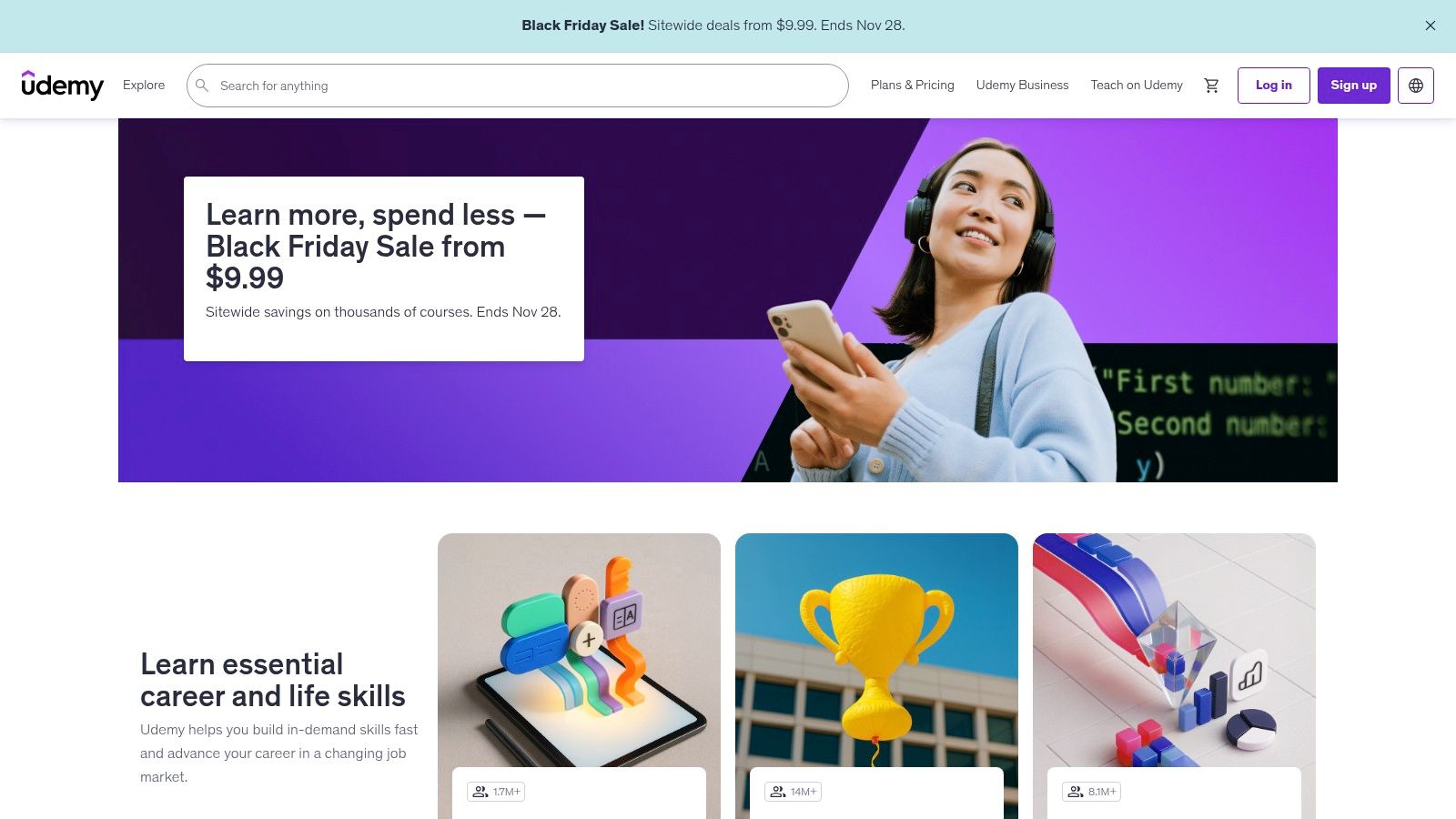
The platform's primary strength is its sheer volume and accessibility. You can find courses on highly specific subjects like options trading with implied volatility, technical analysis using Ichimoku clouds, or fundamental analysis for value investing. Because courses are sold individually with lifetime access, learners can build a personalized curriculum over time. The user review and rating system is crucial for vetting quality, allowing you to see what other students thought before you enroll.
Who It's Best For
Udemy is ideal for beginners looking for a low-cost entry point into stock market education and intermediate traders who want to learn a very specific skill without enrolling in a comprehensive program. If you want to learn the basics of technical analysis, for example, you can find a highly-rated, focused course for a small one-time fee. It's perfect for those who value flexibility and want to learn at their own pace.
Key Features & Pricing
| Feature | Description |
|---|---|
| Massive Course Variety | Thousands of courses cover every imaginable trading and investing topic. |
| Lifetime Access | Pay once for a course and access the materials forever, including future updates. |
| User Reviews and Ratings | A robust social proof system helps you gauge course quality before buying. |
| Frequent Sales | Courses that are regularly priced over $100 are often on sale for under $20. |
Pricing on Udemy is dynamic. While courses have a "list price" (often $99+), the platform runs near-constant sales that drop the cost to between $12 and $30. Users can purchase courses individually for lifetime access or opt for a "Personal Plan" subscription for a curated selection of content. They also offer a 30-day money-back guarantee on most course purchases.
Pros and Cons
-
Pros:
- Extremely Affordable: Frequent sales make it one of the most budget-friendly options available.
- Wide Selection: Unmatched variety allows you to find courses on highly specific, niche topics.
- Flexible Learning: Lifetime access and a self-paced format are ideal for busy learners.
-
Cons:
- Variable Quality: Content quality is inconsistent and depends heavily on the individual instructor.
- Lack of Curation: The sheer number of choices can be overwhelming for beginners.
Explore the benefits of self-paced online learning environments to see how they compare to more structured programs.
5. Corporate Finance Institute (CFI)
For aspiring finance professionals and investors who want to build a career-grade understanding of capital markets, the Corporate Finance Institute (CFI) offers a highly structured, credential-focused curriculum. Unlike platforms geared toward retail day trading, CFI provides rigorous, professionally accredited programs designed to land jobs in investment banking, equity research, and asset management. This makes it one of the best stock market courses for those who view investing as a serious profession rather than just a hobby.
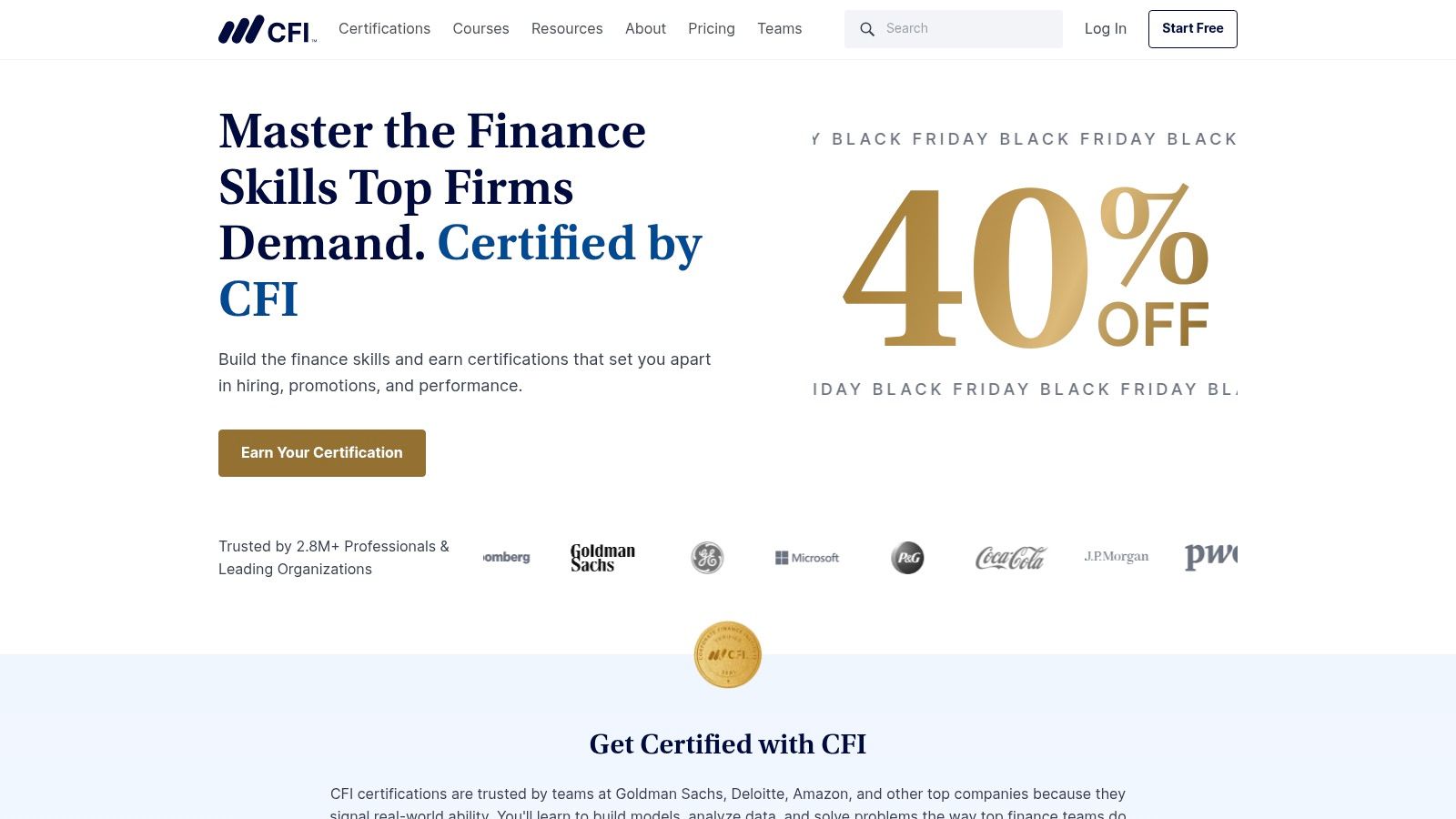
The platform’s core strength lies in its specialized certification tracks, such as the Capital Markets & Securities Analyst (CMSA)® program. This guided learning path takes you from foundational concepts in equities, fixed income, and derivatives to advanced topics like portfolio management and technical analysis. The courses are packed with practical, real-world tools, including downloadable Excel templates, financial models, and case studies, allowing you to directly apply what you learn. This emphasis on job-ready skills sets CFI apart.
Who It's Best For
CFI is perfectly suited for career-driven individuals, including university students, recent graduates, and professionals transitioning into finance. If your goal is to earn a recognized credential to bolster your resume and gain the technical skills required for a capital markets role, this platform is an excellent choice. It’s less ideal for casual investors or day traders looking for quick, tactical trading strategies.
Key Features & Pricing
| Feature | Description |
|---|---|
| Professional Certifications | Structured learning paths like the CMSA® provide industry-recognized credentials. |
| Practical Learning Tools | Includes downloadable templates, real-world case studies, and financial models. |
| Accredited Courses | Offers over 200 courses with Continuing Professional Education (CPE) credits. |
| Expert Support | The Full-Immersion plan provides 1:1 expert Q&A, model feedback, and AI tutoring. |
CFI operates on a subscription model with annual billing only. The Self-Study plan gives you all-access to courses and certifications for $497/year. The Full-Immersion plan, which adds personalized support and career tools, is priced at $847/year.
Pros and Cons
-
Pros:
- Strong Career Focus: Curricula are explicitly designed to build job-ready skills for finance roles.
- Recognized Credentials: Certifications like the CMSA® add significant value to a professional resume.
- Practical and Applied: Heavy emphasis on hands-on learning with templates and real-world case studies.
-
Cons:
- Higher Upfront Cost: Annual-only billing requires a larger initial investment than monthly plans.
- Less Focus on Trading Tactics: Primarily geared toward long-term investing and financial analysis, not short-term trading.
To learn more about CFI's structured programs, visit their official website.
6. Warrior Trading
For learners who want an immersive, action-oriented approach to day trading, Warrior Trading offers a comprehensive ecosystem that combines education with real-world application. Unlike platforms that focus broadly on long-term investing, this one is laser-focused on the fast-paced world of active trading. It provides a structured curriculum alongside live tools and a community, making it one of the best stock market courses for those who learn by doing.
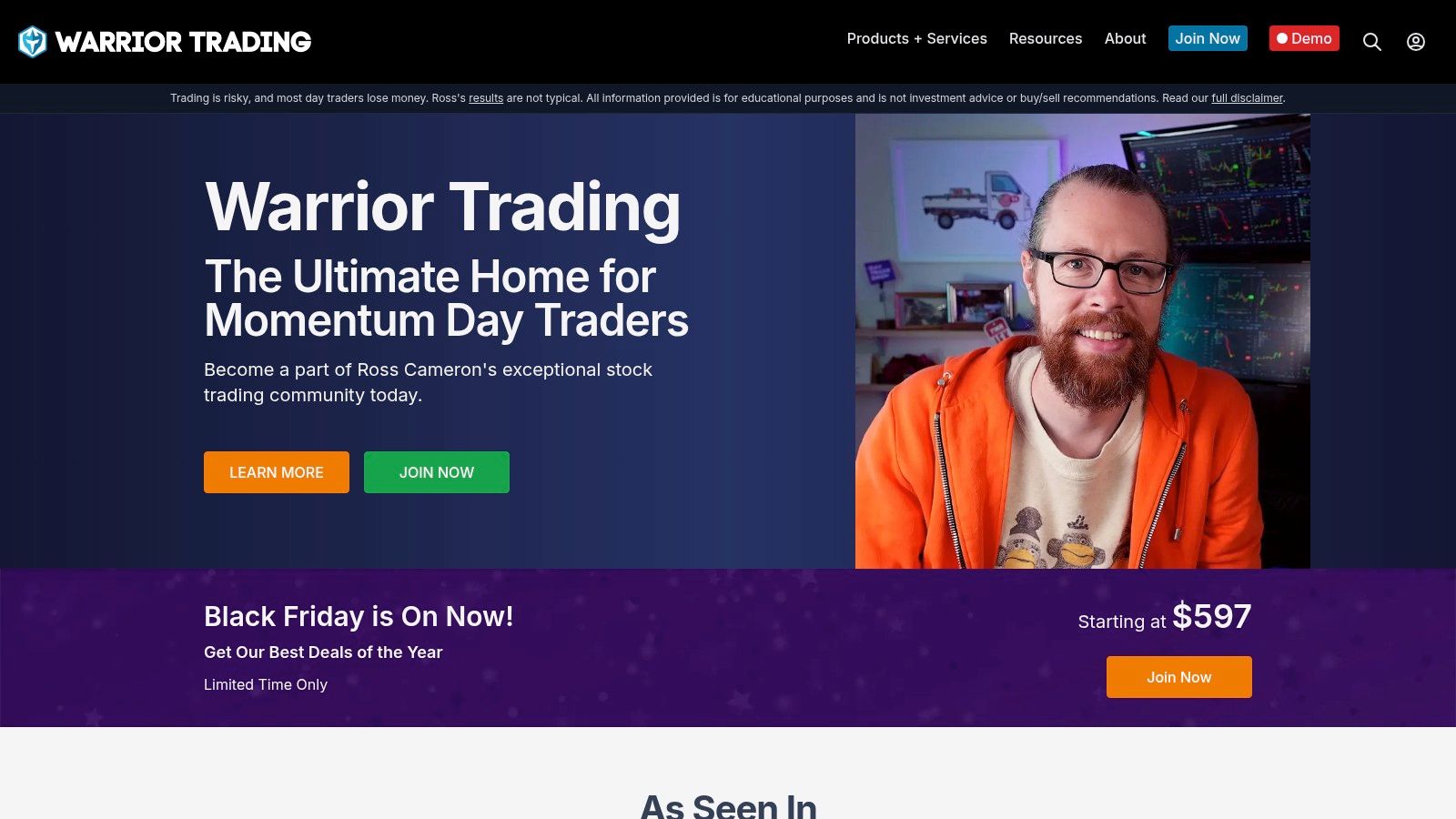
The platform’s strength lies in its integrated learning environment. Members gain access not only to multi-course video tracks but also to a live trading chatroom, real-time trading simulator, and proprietary scanners. This combination allows students to learn a strategy, practice it in a simulated environment without risking capital, and then watch professional traders apply similar concepts in the live market, all within the same platform. This hands-on methodology is designed to shorten the learning curve for active trading.
Who It's Best For
Warrior Trading is ideal for aspiring and intermediate day traders who thrive in a high-energy, community-driven environment. If your goal is to learn specific, repeatable strategies for short-term market movements and you value practicing with professional-grade tools, this platform is a powerful choice. It’s particularly well-suited for hands-on learners who want to bridge the gap between theory and practical execution quickly.
Key Features & Pricing
| Feature | Description |
|---|---|
| Structured Day Trading Courses | Multi-course tracks (Starter to Pro) covering strategies from small-cap momentum to options. |
| Live Trading & Community | Access to live trading streams and chatrooms to watch mentors and interact with peers. |
| Real-Time Trading Simulator | Practice trading with realistic market data without risking real money. A key tool for skill development. |
| Proprietary Tools | Members can use the Day Trade Dash platform for market scanning and charting. |
Pricing is premium and structured around tiered memberships. The Warrior Starter program begins around $997 (often with promotions), while the comprehensive Warrior Pro package, which includes lifetime access to all courses and tools, can cost several thousand dollars. Add-ons like the simulator and live room access can increase ongoing costs, so it’s important to review the package details carefully.
Pros and Cons
-
Pros:
- All-in-One Ecosystem: Combines structured coursework with essential practice tools and a live community.
- Hands-On Learning: The emphasis on simulation and live trading is excellent for practical skill-building.
- Clear Learning Path: Tiered programs provide a structured progression from beginner to advanced concepts.
-
Cons:
- High-Risk Focus: The curriculum is heavily oriented toward active day trading, a high-risk activity not suitable for everyone.
- Premium Price Point: The initial investment is significantly higher than marketplace-style courses.
Learn more at Warrior Trading.
7. Bear Bull Traders
For traders who thrive on community interaction and real-time guidance, Bear Bull Traders offers a comprehensive ecosystem that extends far beyond static course materials. It is a membership-based platform that combines a library of courses with live onboarding, active chatrooms, and direct mentorship. This approach makes it one of the best stock market courses for active day traders who want to learn strategies while being part of a supportive network of peers and professionals.
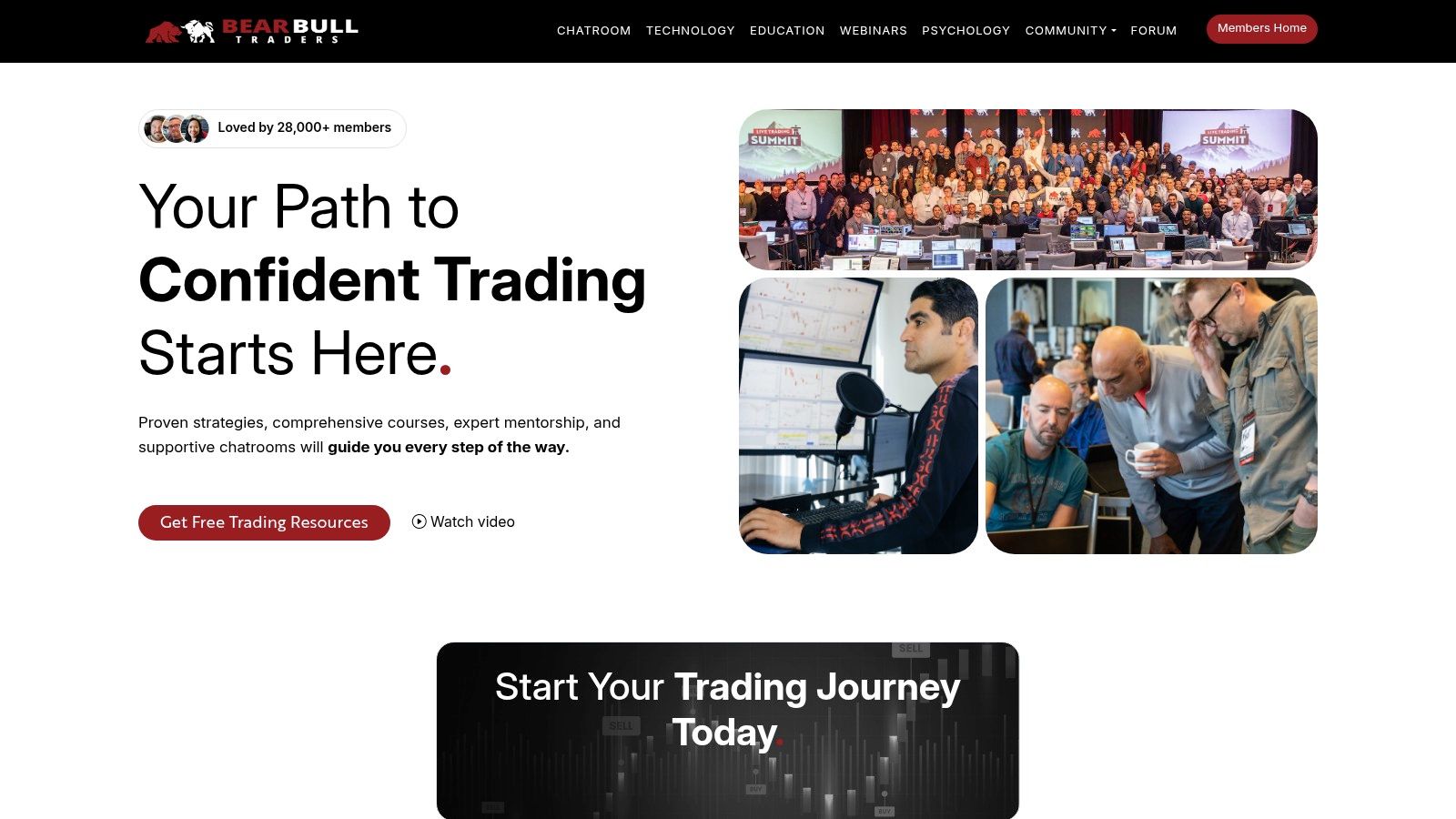
The platform’s core strength lies in its blend of structured education and continuous support. Members progress from foundational day trading and options courses to live mentorship sessions and weekly webinars covering new strategies and market analysis. The emphasis on trading psychology is a standout feature, providing traders with crucial tools to manage the emotional challenges of active trading. This community-first model ensures that learners can ask questions in real-time and get immediate feedback, accelerating their learning curve.
Who It's Best For
Bear Bull Traders is ideal for aspiring and current day traders who seek an immersive, interactive learning environment. It’s perfect for individuals who value accountability and want to connect with other traders to share ideas, review trades, and navigate market volatility together. If you are looking for an active community to grow with rather than a passive, self-study course, this platform is an excellent fit.
Key Features & Pricing
| Feature | Description |
|---|---|
| Live Trading Community | Active chatrooms provide a space for real-time Q&A, accountability, and peer support. |
| Structured Onboarding & Mentorship | Includes live onboarding, weekly mentorship sessions, and ongoing webinars for continuous learning. |
| Comprehensive Course Library | Access to extensive courses covering day trading, options, and trading psychology. |
| Trial & Guarantee | Offers trial periods and money-back guarantees for new members to test the platform. |
Pricing is subscription-based with several tiers. The Intro plan provides trial access, while Basic and Elite memberships offer escalating access to chatrooms, courses, and mentorship, with monthly or annual payment options. Full access often requires an ongoing subscription.
Pros and Cons
-
Pros:
- Strong Community and Live Support: Excellent for real-time feedback and accountability from peers and mentors.
- Structured Learning Path: A clear progression from onboarding to advanced mentorship helps build skills systematically.
- Focus on Trading Psychology: Dedicated resources help traders develop the mental resilience needed for success.
-
Cons:
- Geared Toward Active Trading: The curriculum is not designed for passive or long-term investing strategies.
- Recurring Subscription Cost: Full access requires an ongoing monthly or annual fee, which can be a significant investment.
Top 7 Stock Market Courses Comparison
| Platform | 🔄 Implementation Complexity | ⚡ Resource Requirements | ⭐ Expected Outcomes | 💡 Ideal Use Cases | 📊 Key Advantages |
|---|---|---|---|---|---|
| Colibri Trader | Moderate — structured, mentor-led courses 🔄 | Low–Moderate — free previews; paid gated programs; pricing not public ⚡ | High — practical price-action skills, discipline, consistency ⭐ | Traders seeking hands‑on price‑action training and mentor support 💡 | Strong social proof, focused system, free entry points 📊 |
| Coursera | Low–Moderate — course-based academic structure 🔄 | Low — audit free; pay for verified certificates; self‑paced ⚡ | Moderate–High — strong fundamentals and recognized certificates ⭐ | Learners wanting university‑level theory and credentials 💡 | University instructors, rigorous syllabi, credentialing 📊 |
| edX | Low–Moderate — university/institution courses 🔄 | Low — many free audit tracks; transparent course lengths/costs ⚡ | Moderate–High — credible instruction with optional certificates ⭐ | Introductory to specialized market topics with institutional backing 💡 | Transparent programs and institution partners 📊 |
| Udemy | Low — single-course, self‑paced marketplace 🔄 | Very Low — individual purchases, frequent sales, lifetime access ⚡ | Variable — outcome depends on instructor/course quality ⭐ | Budget learners seeking specific tactical or niche topics 💡 | Vast selection, previews/reviews, affordable during sales 📊 |
| Corporate Finance Institute (CFI) | Moderate–High — structured career tracks & assessments 🔄 | High — annual billing options; time investment for certifications ⚡ | High — career-ready skills, accredited certificates (CMSA) ⭐ | Finance professionals seeking credentials and practical templates 💡 | Structured curricula, templates/case studies, recognized certificates 📊 |
| Warrior Trading | High — live rooms, simulators, proprietary tools 🔄 | High — premium memberships and add‑ons; ongoing cost ⚡ | High (for active traders) — live practice and day‑trading skills; higher risk ⭐ | Active/day traders who want real‑time practice and tools 💡 | Live streams, trading simulator, scanning/charting tools 📊 |
| Bear Bull Traders | Moderate–High — membership + ongoing mentorship 🔄 | Moderate — monthly fees; trial/money‑back options ⚡ | High — improved execution, accountability, ongoing support ⭐ | Traders needing community, mentorship, and regular coaching 💡 | Strong community, live onboarding, weekly mentorship/webinars 📊 |
Making Your Final Decision: Which Trading Course Is Right for You?
Navigating the landscape of the best stock market courses can feel as complex as reading a chaotic price chart. You've now seen a detailed breakdown of seven distinct paths, from academic, university-backed programs to immersive, community-driven trading rooms. The crucial takeaway is this: the "best" course is not a universal title. It's a deeply personal choice that must align perfectly with your individual goals, available capital, learning preferences, and, most importantly, your trading personality.
This guide was designed to move beyond surface-level reviews and provide a clear framework for your decision. We dissected each platform's core methodology, ideal student profile, and the tangible skills they aim to impart. Now, the final step is yours. It's time to transition from research to action by honestly assessing what you truly need to succeed.
A Quick Recap: Matching the Course to Your Goals
Let's distill the options down to their core purpose to help you find your fit:
- For the Academic Foundation: If your goal is to understand the "why" behind market mechanics, financial theories, and economic principles, platforms like Coursera and edX are unparalleled. They provide structured, credible knowledge from world-class institutions, ideal for building a rock-solid theoretical base or exploring finance as a potential career path.
- For the Aspiring Finance Professional: If you're aiming for a formal career in finance, the Corporate Finance Institute (CFI) offers a direct and credential-focused curriculum. Its certifications are designed to be immediately applicable in corporate settings, making it a strategic choice for career advancement.
- For the Immersive Day Trader: If you thrive in a fast-paced, community-centric environment and want to learn by doing, Warrior Trading and Bear Bull Traders offer robust ecosystems. These platforms are built around live trading, real-time mentorship, and extensive toolsets, catering to those who want to be deeply engaged in the market daily.
Finding Your Edge: The Power of a Singular Focus
While comprehensive platforms have their place, many aspiring traders find lasting success by mastering a single, powerful methodology. This is where a specialized program like Colibri Trader carves out its unique value. Instead of overwhelming you with countless indicators and conflicting strategies, it champions a clean, uncluttered approach centered on the universal language of the market: price action.
This philosophy is built on the premise that all known information is already reflected in the price. By learning to read supply and demand imbalances directly from the charts, you develop a repeatable skill that is market-agnostic and timeless. It’s a method designed not just to find trades, but to build the psychological discipline and patience required for long-term profitability. For traders frustrated by analysis paralysis or inconsistent results, this singular focus can be the clarifying force that finally unlocks consistent performance.
Your Actionable Next Steps
Before you invest your hard-earned money, take these final steps to ensure you're making a wise decision:
- Define Your "Why": Are you seeking a side income, a full-time career, or intellectual stimulation? Your primary motivation will heavily influence which educational style is right for you.
- Assess Your Learning Style: Do you learn best from academic lectures, live demonstrations, or self-paced, mentor-guided exercises? Be honest about what keeps you engaged.
- Evaluate Your Risk Profile: A course focused on high-frequency day trading has a different risk-reward profile than one teaching long-term value investing. When you begin to implement strategies, understanding the nuances between key metrics is vital. For instance, it's essential to grasp the differences between concepts like Profit Factor and Risk-Reward Ratio to manage your capital effectively.
- Commit to the Process: No course is a magic bullet. Your success will ultimately depend on your commitment to studying, practicing, and applying the material with discipline.
Choosing the right trading education is the most critical investment you will make in your financial journey. It’s the foundation upon which every future trade will be built. Use this guide to choose with confidence, and commit to the path that resonates most with your vision of success. The markets will always be there, but the opportunity to build a powerful, life-changing skill starts now.
Ready to master a clean, repeatable trading strategy without the noise of indicators? Discover the focused price action methodology taught at Colibri Trader. If you're serious about building a professional trading skillset based on proven principles, this is your next step. Learn more and see if the program is the right fit for you at Colibri Trader.


